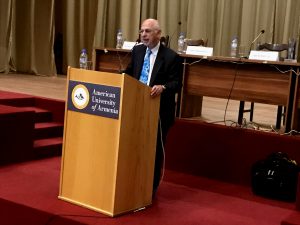Special to the Armenian Weekly
YEREVAN (A.W.)—More than 400 healthcare professionals gathered at the American University of Armenia in Yerevan for the 11th Annual Osteoporosis Symposium, on Oct. 5. The annual conference draws medical professionals from the entire country and features distinguished faculty members from the United States, Russia, and Armenia, who this year presented the latest in osteoporosis research, care, and prevention.

More than 400 healthcare professionals gathered at AUA in Yerevan for the 11th Annual Osteoporosis Symposium, on Oct. 5 (Photo courtesy of Shamiram Barooshian)
The conference is directed by Dr. John P. Bilezikian, professor and osteoporosis specialist at Columbia University’s College of Physicians and Surgeons. Dr. Bilezikian travels to Armenia each year for the conference as part of his ongoing efforts to promote education about osteoporosis across Armenia and to help empower healthcare professionals to diagnose and treat patients suffering from the disease. He also directed a course in bone mineral density technology and measurement, a first for Armenia.
Over the past 10 years, Dr. Bilezikian has enabled the donation to Armenia, by the Hologic Corporation, of eight bone densitometers, called dual energy X-ray absorptiometers (DXA). When he began his work in 2007, Armenia was at the bottom of the world’s list of DXA units per capita; now, the country is well above average internationally. These efforts have been supported, in part, by the Hirair and Anna Hovnanian Foundation and the JHM Foundation. Over the years, Dr. Bilezikian has worked closely with medical professionals in the United States, Armenia, and Eastern Europe to make these efforts a reality.
At this year’s Symposium, one of the focal points of conversation was the prevention of osteoporosis, a global disorder of compromised bone strength leading to an increased risk of a bone fracture. It affects over 200 million people worldwide. Although anyone can suffer a fracture if the trauma is great enough, osteoporosis patients are more likely to break a bone after a relatively low-impact event, such as a fall from standing height. These “fragility fractures” typically occur in the hip, spine, and forearm. When they occur in the hip in the elderly, lifespan is reduced and quality of life is compromised. It’s often unappreciated that osteoporosis is a dangerous disease because of this heightened fracture risk.
The faculty at this year’s symposium emphasized that although bone loss is an inevitable result of aging, other factors such as diet, exercise, and other lifestyle choices can affect the degree of bone loss. For example, Kim Hekimian, a nutrition specialist and researcher from Columbia University, addressed the importance of nutrition for bone health. As part of her presentation, she identified foods that are common and readily available in the Armenian diet and specified their nutrients—or lack thereof. She encouraged foods like madzoun (yogurt) for calcium, dolma for zinc, oranges for Vitamin C, and lentil salad for folate. Potatoes, she said, are nutritious—but only if they still have the peel. She cautioned that although white bread in different forms is a staple of the Armenian diet, it is devoid of many nutrients.
Bread in many countries is fortified, but in Armenia it is not. Some experts believe fortifying bread with essential nutrients, such as folate and iron, could make a huge and safe impact on nutritional sufficiency in Armenia, as it has in many countries, including the United States.
Other speakers at the symposium emphasized the importance of regular exercise and the scourge of cigarette smoking, which is widely prevalent among Armenians. Smoking is a major risk factor for osteoporosis, as it is for many other chronic diseases.
The keynote lecture was delivered by President of the Russian Osteoporosis Association Olga Lesnyak (Russia). The professor spoke about fracture risk assessment, also known as FRAX, a statistical tool designed to accurately predict fracture risk in the next 10 years based on a patient’s personal risk factors, such as age, sex, previous fracture, family history of fracture, smoking, excessive alcohol intake, and bone density. The tool compares the individual’s data with a database of risk factors within the country and weighs the relative importance of each factor. Before 2016, Armenia did not have its own database and, thus, used data from a surrogate country, Romania, in the interim. But thanks to the efforts of Dr. Lesnyak, Dr. Bilezikian, Varta Babalyan (director of the newly created Osteoporosis Center of Armenia), and Dr. Sarkis Sahakyan, country-specific data was collected for Armenia between 2013 and 2015. Today, fracture risk assessment for Armenians is accurately reflected. Armenia is one of 55 countries to have obtained its own database for FRAX.
The goal of the symposium, which featured presentations from 12 faculty, is to help Armenian patients and physicians better understand, prevent, and treat osteoporosis. The number of people affected by the disorder is expected to increase 240% in the next 10 years, and Narine Mamikonyan of the Armenian Osteoporosis Association has called osteoporosis “one of the most dangerous diseases of the 21st century.” But with the work of people like Dr. Bilezikian, Armenia is rapidly becoming better equipped to prevent and to manage osteoporosis.
The post Dr. John Bilezikian Leads International Osteoporosis Symposium in Yerevan appeared first on The Armenian Weekly.
Source: Armenian Weekly
Link: Dr. John Bilezikian Leads International Osteoporosis Symposium in Yerevan


